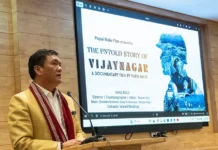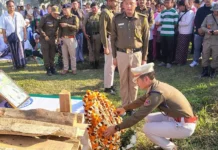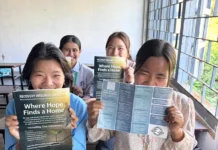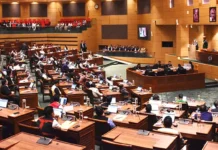[Vijaylakshmi Nagaraj]
As Arunachal Pradesh celebrates fifty years of its birth, I too felt like celebrating this golden moment. What is the connection? Well, it’s a beautiful story that I thought I must share on this momentous occasion.
My father, late GS Mani, belonged to the erstwhile North East Frontier Agency (NEFA) cadre and served as private secretary to the governor of Assam for over 26 years. His connection with Arunachal Pradesh goes back to the days when it was part of Assam, and he had travelled to every district with the governors as they had to tour these areas. I recall his visits to Tawang, Bomdila, Mechukha, Khonsa, Seppa and all the other districts. He would tell us about his visits, travels, the dances, food and culture. He even had a few headgears of the different tribes.
The NEFA gained union territory status in 1972 and was named Arunachal Pradesh. My father was posted to the first legislative assembly that was established, as undersecretary. The temporary capital was in Naharlagun. The present capital, Itanagar, near the Ita Fort was established later.
I was visiting my parental home in Shillong for the first time after marriage when father had to move to Arunachal Pradesh.
My parents, my three siblings and I moved to Itanagar in 1975. I was happy that I could accompany them to this new state.
Forty-seven years, yes, is a long time ago, with bag and baggage we drove to Itanagar. It was a long drive from Shillong but we were excited. When we were reaching, it was getting dark. There were no streetlights – the only lights visible were in the houses dotted around the villages. We were also warned about wild elephants in that area.
Our arrival took us to a brand new house in Sector D opposite the circuit house of those days. A tired family of six who were waiting to see the new dawn in a new place, a new state: Arunachal Pradesh, the Land of the Dawn-lit Mountains, as beautiful as the sunrise every morning.
I recollect the new house we moved into in Sector D, diagonally opposite the circuit house, made in the style of those days, with sloped tin roofs, to cater for the rainy season, grey-coloured wooden beams on a verandah, small and compact with a pretty little garden space which was later enclosed by a bamboo fence. The open area all around, with one main road leading from one end to the other. I remember a petrol pump and the state bank.
My mother, late Saraswathi Mani, had packed rations for six months as she had to feed her brood of four and the nearest town was North Lakhimpur, at a distance of about 68 kms.
It was an unknown place, but she had no fear and was a tough lady. She had rations for simple vegetarian meals. My parents were pure vegetarians, but she would make omelettes for us children and my father. In fact, she would barter salt for some fresh ‘lai patta’, potatoes and eggs with the local women who sold them in the open along the street.
Father got busy at the assembly. He organised everything from scratch. He would spend long hours in the office. I recollect him recruiting many a new staff member for administrative work. Many were from Kerela and Tamil Nadu and had to pass the Hindi exam for functional purposes. This was a government rule. My father had passed his Hindi from the Hindi Prachar Sabha and was very proud of his feat. He would encourage the staff to do the same, though many would want to be exempted from doing the exam.
Setting up the assembly and guiding the new members kept him happily occupied. The home front was managed by mother. She soon had a beautiful kitchen garden going. She also had a pretty flower garden along the fence. My mother had green fingers. We grew up eating home-grown fresh vegetables. She ensured that we had wholesome, nutritious food.
We children were given our little responsibilities to help in the household chores. What I recollect vividly is that, at night elephants would come and destroy the pipes which supplied water. Probably it was the ‘elephant corridor’.
This happened many a night. So, the next morning we had no running water in our house. Mother would send us with buckets down to the river which ran through the town, the Naharlagun river, known as Barapani.
The water was cold and crystal clear with pebbles visible. It was a picturesque sight. There were green trees along the river and the local ladies would collect water, have a bath and wash their clothes.
We did the same. It was such fun for us. The four of us would troop down to the river, have a bath, wash clothes and bring water to the house. ‘When in Rome, do as the Romans do’ is an old saying which actually means ‘respect the host, respect the local traditions and culture’, which my parents always believed in and followed.
We settled down to a new life in a new place. We had no problem. The people were so good and friendly. The whole town knew one another. My father was known as ‘Mani Saheb’. He was a loving and good human being. He helped each and everyone in Itanagar, guiding them about education and jobs and giving them worldly advice.
The governors, late KAA Raja and late RN Haldipur, Dubey and T Rajeshwar – they were all very good friends of my parents. In fact, when my father retired, he visited late Haldipur, who had settled down in Bangalore.
The chief ministers, PK Thungon, late Tomo Riba and Gegong Apang, were other familiar names with whom my parents had a great rapport.
Soon, my youngest sister joined the Kendra Vidyalaya and was Roll No 1. She and her friends were the first batch to pass out from KV Itanagar. She is proud to have been Roll No 1 at her alma mater.
Jyoti Meenakshi is a CEO of Excetra Workspace Solutions, settled down in Bangalore with her family.
My brother Deepak joined the college in Pasighat and stayed in the hostel for some time. Later, he did commerce from Guwahati and has settled down in Delhi as general manager of Indian Compressors Ltd.
My sister Uma actually gathered the local tribal children, all the little ones, and set up a makeshift school in the open stadium area and taught them basic English. There were about 30 children and she provided them with slates, chalk, books and pencils. She was very concerned about their education as there were no schools for the little ones.
Life started on a happy, positive note: a new place, a new beginning.
There is more to share about life in Itanagar, my sister’s marriage, the birth of our daughter, the inner line permit, the assembly, the speaker who studied in my husband’s school. Oh, yes, there is more to come; memories so beautiful, memories to treasure. (Contd in next article. Vijaylakshmi Nagaraj (nee Mani) is a well known children’s writer, educational consultant and storyteller based in Bangalore. Email: vijaylakshmi.nagaraj@gmail.com.)




